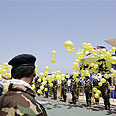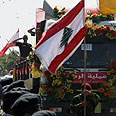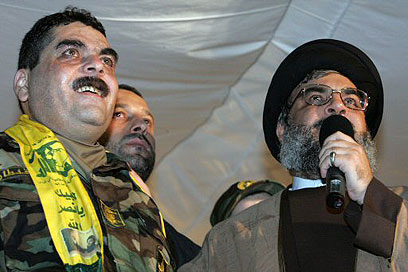
Lebanon parties
Photo: AP

Prisoners welcomed in Nakura
Photo: AFP
On the dawning of the day after the prisoner swap deal, enacted with Hizbullah on
Wednesday, media linked to the Shiite group continue to celebrate with articles commending Hizbullah's "victory," which included the return of convicted murderer Samir Kuntar to Lebanon.
"Salaam to you, people of Lebanon,"
Lebanese newspaper al-Akhbar called out. The paper, which has ties with Hizbullah, covered the affair closely. The article quoted from Hizbullah leader Hassan Nasrallah's speech, in which he said he would now turn to "strategic" matters such as the releasing of the Shabaa Farms and the defense of Lebanon.
So Who Won?
Roee Nahmias
Foreign ministry launches video explaining to Arab world who 'real Samir Kuntar' is: 'Hizbullah is terrorist organization that sees cold-blooded child murderer as hero,' spokesperson says in Arabic. Political officials satisfied with Israeli hasbarah of prisoner swap
As-Safir news launched the title, "Second July: Freedom for the prisoners and national unity", and presented the "victory" as equal to Hizbullah's achievements in the Second Lebanon War two years ago. "July 16 is an historical day, a day of unity," the paper said.
"Arab and Lebanese joy at the return of the prisoners and the bones of the shahids (martyrs)," read the title of the article by al-Quds al-Arabi, a London-based paper. Al-Manar celebrated the "national wedding", the name given to the festive affair in Lebanon, and interrupted broadcasts in order to bring live coverage of the funerals of the kidnapped soldiers in Israel.
The network also quoted Israeli news sources, which allegedly determined that Nasrallah had won again. The criticizing statements about Nasrallah in the Israeli press were mostly passed over.

Kuntar with Nasrallah. (Photo: AFP)
The Hariri family's Al-Mustaqbal, Hizbullah's rival newspaper, also offered wide-ranging coverage of the affair, but chose to quote the parts of Nasrallah's speech that stressed the responsibility of the Lebanese nation to defend itself.
Meanwhile, Arab newspapers worldwide were less enthusiastic. The London-based al-Hayat commended the deal with a caricature, but reported only the dry facts of the case. Also in London, al-Sharq al-Awsat refrained from giving the deal a top story, giving it only a secondary headline.
The paper chose to emphasize the new tension expected to rise between Israel and Hizbullah, due to reports by which the organization plans to settle Islamic Jihad and Hamas leaders, including Khaled Mashaal, in Beirut following the establishment of anti-aircraft and surface-to-surface missiles on a strategic mountain range in southern Lebanon, facing Israel.
In Egypt, which published criticisms against Hizbullah during the war, reports were not celebratory. The government's newspaper al-Ahram included only a minor report taken from the news agencies, in which it said that "Israel and Hizbullah have exchanged bones of the dead and five prisoners between them." The report can be seen to express the country's aversion to the organization.















